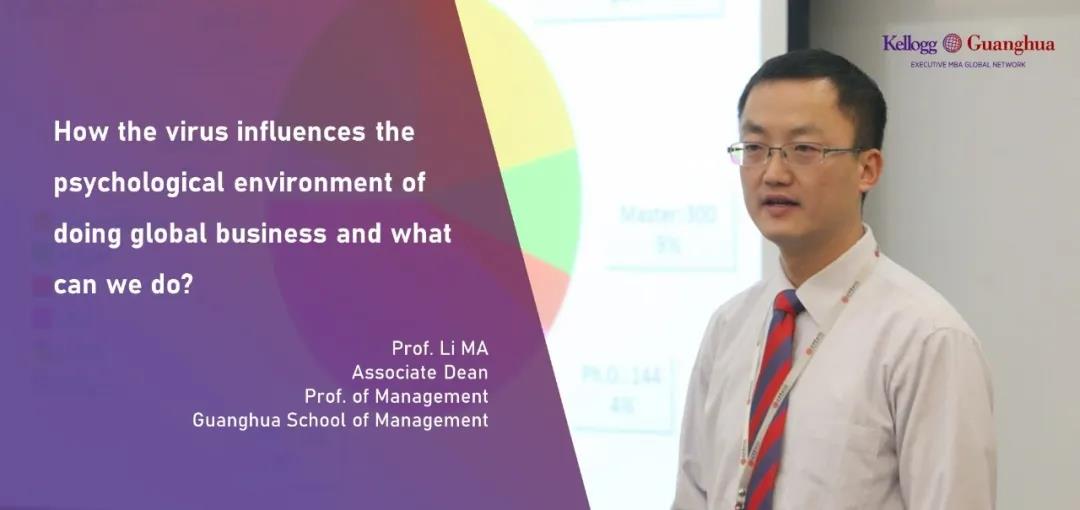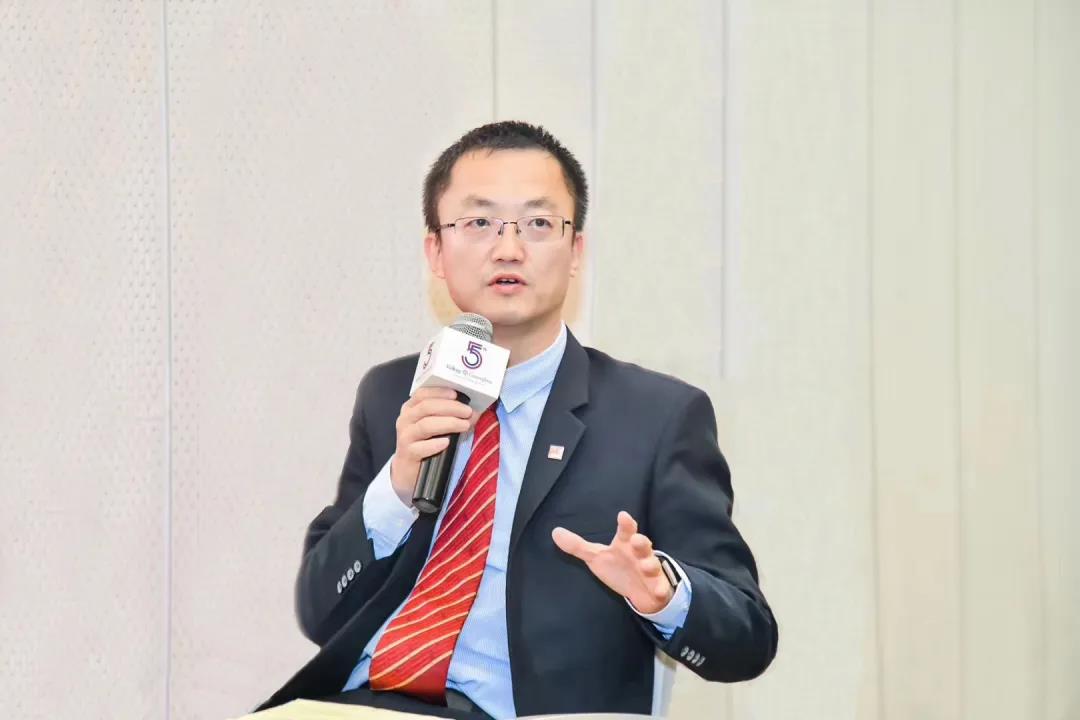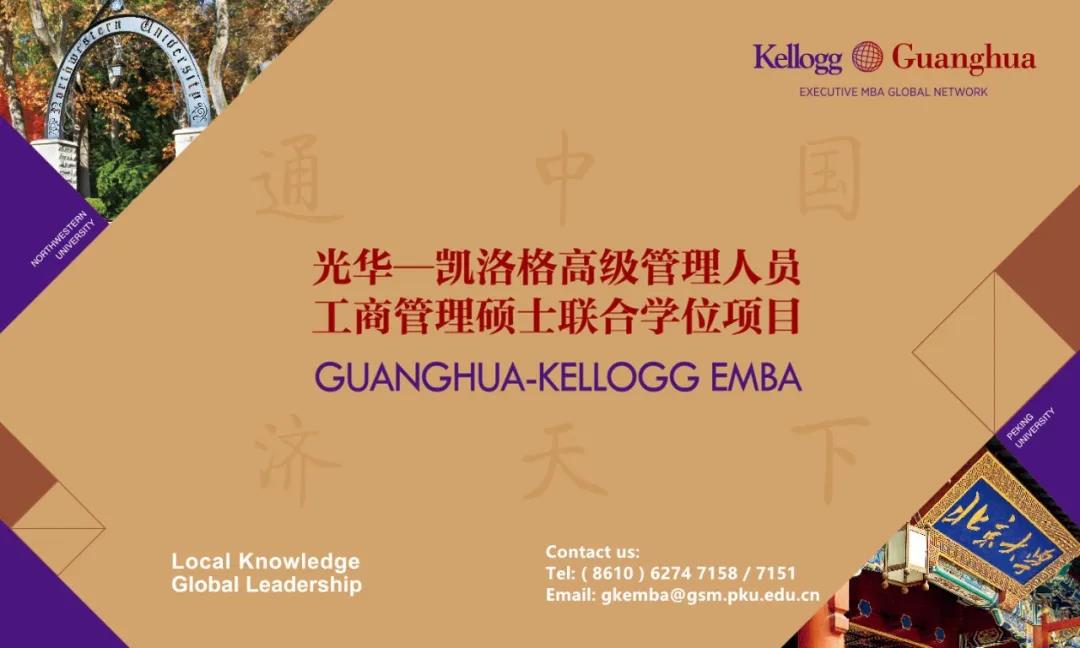Peking University, April 23, 2020: How the virus influences the psychological environment of doing global business and what can we do? Ma Li, professor with Peking University’s Guanghua School of Management, will make three points on Affect, Behavior, and Cognition to analyze the situation from a psychological perspective.
We are now living in a world under the shadow of the virus. People travel less, possibly including you. Right now, we are sharing our opinions online rather than face to face. In the past two months, I haven’t gone to any restaurants or the cinema. I haven’t met any friends or relatives. Still, we can see that the virus and fear have spread quickly from one place to another. Global business has already suffered a lot. The price of crude oil has plummeted. Stock markets around the world have dropped considerably. Many economists have analyzed the virus’ short-term and long-term impacts on the economy, global supply chains, and financial markets. I want to analyze the situation from a psychological perspective: how the virus influences the psychological environment of doing global business and what we can do. I will talk about ABC; that is, I will make three points on Affect, Behavior, and Cognition. These three aspects—affect, behavior, and cognition—are the components of attitudes in classic psychological theories.

Professor Ma Li
First, on affect or emotion: the most salient point for us to realize is that people are very emotional during this period, and that perspective taking and empathy have become more valuable during this difficult time.
The emotional reactions of different people have been very similar after hearing about the virus. People rushed to the supermarket, stocked up on lots of things such as toilet paper, and spent lots of time searching for information, and were influenced by the news they read. However, some of the information that was initially spread has turned out to be false. Well, that’s human nature. Lots of emotions such as fear, anxiety, sensitivity, and even prejudice were evoked.
This COVID-19 period has witnessed a sharp increase in xenophobia. Xenophobia has existed for a long time in human history, and is when people hate others from a different group. It can be represented by racism or extreme nationalism.
Some people were refused by hotels and restaurants, some were discriminated against, and some were even physically abused. Why? Stereotypes and prejudice toward certain groups.
Xenophobia, or sensitivity towards other nationalities, can reach extreme levels. Masayoshi Son is ethnically Korean, but he was born in and grew up in Japan, and is a truly global business leader. In early March, he planned to donate test kits to Japan. However, he was criticized as some thought that his actions would add an unnecessary burden on clinics and hospitals. Some people even said online: “do you want to make Japan look like Korea? The rumors that Sun was anti-Japan came true.” That represents such an extreme case of sensitivity. Son was still seen as an outsider by some Japanese.
When some people are emotional and discriminatory, those who demonstrate empathy and understanding will have a stronger advantage. Empathy during difficult times is applauded and fosters globalization.
Doing business globally is always challenging because you face people who sometimes misunderstand and suspect you. You cannot expect all people to be rational and to support globalization. However, you have to make sure that you recognize their emotions, and deal with their emotions with skill. In other words, global business leaders need to be empathetic and understanding.
In order to equip yourself with the ability and habit of understanding and empathy, you need to interact with and learn from people different to you. You can gain many opportunities to encounter different people, such as when studying in the joint Executive MBA Program hosted by Kellogg and Guanghua, where you will study, discuss, debate, and work with people who grew up in different backgrounds. Our students are all smart, hard-working, and ambitious, but come from many different countries. You will also have the opportunities to participate in courses in our global network at partner schools in Canada, Germany, Israel and Hong Kong as well as the U.S. Interacting within such a diverse group helps everyone become more empathic and understanding.
Second, in terms of behavior: You can become better global business leaders by caring for people close to you and embracing globalization. By doing this, you help make the world a better place.
The virus taught us that we need better management. Not only the idea and determination to manage better, but skills, systems, policies, and techniques to manage better. For example, you need to identify weak signals, be at the front, encourage first-line employees to voice their concerns, review crisis management systems regularly, build stronger teams, encourage solidarity, and so on.
More importantly, true care to all of your stakeholders is the key.
When doing business locally and more so globally, you need the cooperation and help of others. After helping others regularly, you will be more likely to receive help when you are in need.
This point is illustrated very well by the experience of a company founded by one of our alumni. “Log Cabin Barbecue” is a famous restaurant chain. All restaurants in China have been experiencing losses every day. They face cash flow difficulties. What can you do if you are in this business? Mr. Sui Zhengjun, the founder of this chain restaurant, received a proposal from his employees that they were willing to cut their salary in half. Were the employees really willing to do so? He was unsure. So he did an anonymous survey, and 76% of his employees told him: Yes, they were willing to receive only half pay until the crisis is over. Reflecting on the reason why so many employees were willing to receive only half pay, Mr. Sui said it was possibly because he shares profits with his employees. He has an employee shareholding plan such that employees with three years’ tenure can choose to become shareholders.
Thus, he started to share his profits with his employees before the crisis; now, during the crisis, his employees share the burden with him.
In fact, the epidemic is a great time for you to help others, and possibly manage your own business environment to become friendlier. For example, many Japan and Korea donated masks to China in February. Just after a few weeks, when the virus became more serious in Korea and Japan, China donated masks back to them as well. “A friend in need is a friend indeed,” people from these countries now suddenly like one another much more than before.
When you do your business with true concern for your stakeholders, you actually contribute to the global business environment and the world. Globalization expands our business horizons such that all of you can achieve more and contribute more. Globalization also helps fight against the virus. Now, China can produce more than 110 million masks a day, and US is starting to manufacture many masks as well. We can help the rest of the world become better protected. Such behaviors will eventually protect ourselves. Globalization also helps make a peaceful world. According to a famous saying: “When goods don’t travel across borders, soldiers will.”
Especially during these times of uncertainty and panic, I really thank you all because your business across borders is helping the world greatly.
Third, in terms of cognition, misunderstandings about the virus and its impact on economy are many, encouraging leaders like you to learn more and to practice independent thinking.
We have all seen plenty of misunderstandings about the virus: Who are potential victims? How do you avoid being infected? Do I need to wear a mask? When will the vaccine appear? What is effective in controlling it? Lots of information has spread, and we are curious about what is right and what is wrong.
Some people rushed to buy some herbal products to protect them from infection. Some purchased special stones to enhance their immune systems. The demand for ginger in some place increased dramatically. Because “someone said that,” these people thought and acted accordingly.
During times of fear, independent thinking becomes more critical.In my course at Guanghua, I emphasize open-mindedness and independent thinking throughout my course.
Regarding the virus, I’d like to highlight one fact: The pandemic reminds us how interdependent the world is. Not a single person is safe unless the whole world is safe. Sandro Galea, dean of the School of Public Health at Boston University, said infectious diseases threaten everyone in the world, and all will be hurt significantly from an outbreak.
In terms of business, we find the same story: since Chinese tourists did not travel overseas, many holiday destinations in Thailand and Malaysia have experienced very serious losses over the past two months. Because people in China did not dine out in restaurants, lobsters from Australia and New Zealand had to be sent back to the ocean.
About two months ago, someone commented that the virus in China could benefit other countries. However, Paul Krugman, a Nobel Prize laureate, told us that the 21st-century economy features the interdependence of the whole world. Because the countries are so interdependent on one another, cooperation is much more productive than isolation. No matter in which area a country or a firm has strong advantages, only by exchange can we improve and take advantage of our efficiencies.
On January 29, just a few days after China started the rigorous measures to reduce travelling, New York Times published an article: “Coronavirus outbreak tests world’s dependence on China.” In that article, the author wrote: “Apple is rerouting supply chains. Ikea is closing its stores and paying staff members to stay home. Starbucks is warning of a financial blow. Ford and Toyota will idle some of their vast Chinese assembly plants for an extra week.”
China also depends on the rest of the world a lot. Chinese employees are returning to their work now, but the firms also need lots of raw materials from overseas. More importantly, Chinese firms also need global markets to do business.
What we can do to facilitate our critical thinking? Xun Zi, a philosopher in China more than 2300 years ago, said that, “A wise man does not believe in rumors.” I believe all of you are wise people, but you are still eager to make yourselves wiser. Learning solid and systematic knowledge from rigorous programs such as the one Kellogg and Guanghua offer is one way you can avoid being influenced by incorrect ideas. You will then be less likely to accept superficial information because you possess systematic knowledge and logic.
In summary, I learned that this pandemic calls on us to be empathetic and understanding, to care for and help others, to promote globalization, and to learn and think independently. Specifically, my ABCs are:
First, on affect: people are very emotional during the pandemic, and perspective taking and empathy become more valuable at this time of difficulty;
Second, on behavior: as global business leaders, you can embrace and promote globalization, help your stakeholders, and help make the world a better place;
Third, on cognition: misunderstandings are many, encouraging leaders like you to learn systematic knowledge and to practice independent thinking.
About Professor Ma Li
Ma Li is a Professor of Management, as well as Associate Dean at the Guanghua School of Management, Peking University. He obtained his Ph.D. from Washington University in St. Louis. And he studies negotiation, conflict management, and participative management, especially in international contexts. His publications appear in numerous leading academic journals.
About the Guanghua-Kellogg Executive MBA Program
The Guanghua-Kellogg EMBA Program is the first Sino-US joint EMBA Program in mainland China, bringing together the world-class faculties of two premier business schools and featuring a rigorous and cutting-edge curriculum. The program prepares executives with integrated management skills, Chinese business expertise, and a global perspective to lead their organizations in a dynamic environment. Kellogg’s EMBA global network offers students opportunities to engage in collaborations with peer leaders across the globe.


